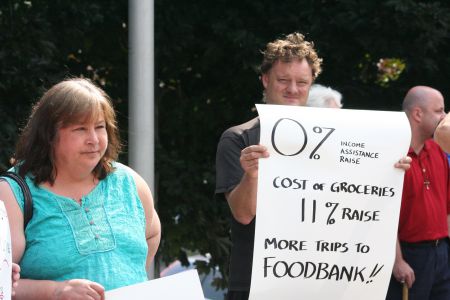KJIPUKTUK (HALIFAX) – A plan to revamp social assistance in Nova Scotia is causing concern among many welfare recipients and community advocates.
The department of Community Services presented its case for change to invited stakeholders in meetings throughout the province.
In these meetings the department talked about the need to simplify the way it supports 52,000 recipients of Income Assistance and Employment Support.
Also highlighted was the department's desire to get more of its clients off the welfare rolls and back to work.
The problem is that people on social assistance often receive almost as much on welfare as they would when working for minimum wage, the department says. This amounts to what it calls a disincentive to work.
The department makes its case by taking into account all the supports available to Nova Scotia's poor beyond income assistance, things like child care subsidies, pharmacare, tax rebates and so forth.
“The bundle of benefits and in-kind supports available to clients are better than those provided in the labour market at entry-level wages,” the department's presentation claims.
Wayne MacNaughton, a local poverty activist with the Community Advocates Network, thinks that the numbers don't match with what actually happens on the ground.
They're using maximum amounts, not what on average people actually get,” says MacNaughton, pointing to his own experience as a single disabled person.
“I get a special diet, transportation, and telephone allowances, but unlike the example in the presentation I don't get the maximum allowances.
Their numbers make welfare look like a really generous system, but hardly anybody is getting that.”
Talk about people on welfare who don't want to work often reinforces existing stereotypes. It plays well politically with those who argue that people on social assistance are lazy and don't deserve welfare.
That is why the department is playing a dangerous game, MacNaughton believes.
“It's the ongoing issue of poor bashing welfare recipients,” MacNaughton says.
James Sawler, an economist who teaches at Mount Saint Vincent University, agrees with MacNaughton that the government's data is flawed.
Sawler points to research by the highly respected Caledon Institute of Social Policy for a more reliable overview of what people on welfare actually get.
“The department takes a single mother who gets every single possible payment available to her in full, and that is a very special circumstance,” Sawler says. “For instance, childcare is included, but we know that there are a very limited number of childcare positions available for people on social assistance.”
The notion that social assistance is so generous that people on welfare don't want to work is misguided, Sawler believes.
He cites Stats Canada's latest job figures for Nova Scotia to make his case.
“There are almost 10 unemployed people competing for every job that becomes available. What that tells us is that the issue of unemployment is a matter of insufficient demand more than that it is an issue of people unwilling to supply their labour,” Sawler says.
Rather than trying to rush people into the bottom layer of the labour force, Community Services should focus on education and childcare, enabling people on welfare to get into the labour force at a higher level, with more stable jobs and higher pay, Sawler says.
MacNaughton has a bit of advice for the government.
If the gap between minimum wage and welfare is a disincentive to work, then maybe it is time to raise the minimum wage, he says.
Getting welfare recipients back to work was not the only issue raised by Community Services during the meetings.
Much was made of the need to simplify a system burdened with too many rules.
Quite a few people on welfare agree with the department's suggestion that a single amount per household and fewer rules would make things better.
But the point is mute if rates don't increase, they say. And on that front the government isn't offering much hope.
In that light, it is especially galling to people on assistance that minister Joanne Bernard has cited the transformation as a reason to freeze social assistance rates.
The normal practice until the Liberals took office.was to offer a yearly increase based on the consumer price index.
Many who attended the meetings, which were by invitation only, hesitate to call them consultations.
“They already have a pretty good idea what they want to do. It is not a true engagement. It is them presenting their ideas and asking for feedback,” MacNaughton tells the Halifax Media Co-op.
“They are not going to do their survey of first voice people until much later. Other than those who managed to get to the table through agency connections, first voices will not be asked,” MacNaughton says.
Community Services says that additional sessions will be held in early Fall. Implementation may occur as soon as 2017.
The department has not yet responded to questions the Halifax Media Co-op submitted last week.
The Benefits Reform Action Group is organizing a rally on August 27th, at 1 PM, at Victoria Park in Halifax, which is across the street from Community Services head office. The coalition of community groups wants to raise issues that were missed or given short thrift during the consultation.
Click here for more coverage of Community Services and social assistance issues.
Follow Robert DeVet on Twitter



